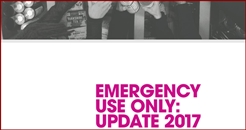 Emergency Use Only: Update 2017
Emergency Use Only: Update 2017
Child Poverty Action Group (CPAG) has recently issued an update to their 2015 report on foodbank use, Emergency Use Only.
CPAG develop and campaign for policy solutions to end child poverty. So the purpose of this update re foodbank use was to see what more had been learned, what initiatives were working locally, what policies had been changed and what still needs to be done.
Here is a summary:
Two years ago, Emergency Use Only helped shed light on the factors driving food bank use in the UK. Since then, further evidence has corroborated what was found: that some relatively simple changes – to the operation of the social security system in particular – could make a huge difference, and help to drive down food bank use.
Today, the numbers of people using food banks remain high, and large numbers of people are still facing unmanageable financial insecurity. Yet is seen from local initiatives across the country – many of which are showcased in this report – that the challenges food bank users face can be overcome. Much of this good work could be scaled up nationally.
They are pleased to note in this report, areas in which government has been receptive to making changes that can help. The report also highlights areas where there is more that can be done.
Even in a highly effective and efficient system, when administering social security payments to millions of people, there are bound to be delays and errors. The government is urged therefore, to ensure that there are robust systems in place – the safety net beneath the safety net – to protect vulnerable claimants when things do go wrong.
This report highlights a number of actions that could help secure the changes needed. In particular, they would like to see existing provisions – such as short-term benefit advances and hardship payments – better advertised, given ongoing evidence of low awareness among food bank users of their existence.
Overall, the message of the report is twofold. Food banks are doing a lot to understand and address hunger and poverty in the UK. However, it is heartbreaking that, in twenty-first century Britain, large numbers of people need to be referred for emergency food provided by charities in order to feed themselves. The good news is that, as the examples throughout this report show, the income crises that drive people to food banks can be prevented – and change is possible.
Some further insights:
-
Although the number of three-day emergency food supplies provided to people in crisis by Trussell Trust food banks has continued to rise, increases have been less dramatic since 2014.
-
The Department for Work and Pensions has made some welcome moves with the work, health and disability green paper, which includes scrapping work capability assessments for the chronically ill.
-
When fully operational, the new universal credit system should represent a significant step forward in reforming benefit provision, especially in ensuring continuity between in-work and out-of-work support. However, concerns remain about the impact of the initial wait for the first universal credit payment, especially on the low paid, who do not have financial reserves on which to fall back. The provision of a ‘budgeting advance’ for those who indicate they may have financial difficulties is welcomed but this system should be subject to close and transparent monitoring.
-
Another relevant major government initiative is the introduction of the national living wage of £7.20 per hour in April 2016, with it reaching a target of 60 per cent of current median earnings by 2020. This will make a welcome contribution towards tackling Britain’s low-pay economy.
-
Reasons why many people are left with little option other than to use a food bank are; a) levels of the main income-replacement benefits in the UK, as well as incomes provided by many low-paid jobs, are well below what most people would define as an acceptable standard of living and it is not realistic to save in order to guard against financial shocks - leaving people in a very vulnerable position. b) There are a number of situations in which the social security system is not currently offering the level of protection that it was designed to deliver - late payments, quick use of sanctions (although these are reducing), local variation in emergency payments.
-
The experience of food bank users indicates that mental health is a particular challenge for many.
Download the update here.
Retweet about this article:
From a report by CPAG, 16/01/2018